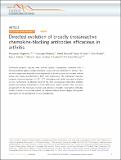Directed evolution of broadly crossreactive chemokine-blocking antibodies efficacious in arthritis
Author(s)
Miyabe, Yoshishige; Miyabe, Chie; Luster, Andrew D.; Angelini, Alessandro; Newsted, Daniel; Kwan, Byron Hua; Kelly, Ryan Lewis; Jamy, Misha N.; Wittrup, Karl Dane; ... Show more Show less
Downloads41467-018-03687-x.pdf (1.573Mb)
PUBLISHER_CC
Publisher with Creative Commons License
Creative Commons Attribution
Terms of use
Metadata
Show full item recordAbstract
Chemokine receptors typically have multiple ligands. Consequently, treatment with a blocking antibody against a single chemokine is expected to be insufficient for efficacy. Here we show single-chain antibodies can be engineered for broad crossreactivity toward multiple human and mouse proinflammatory ELR+CXC chemokines. The engineered molecules recognize functional epitopes of ELR+CXC chemokines and inhibit neutrophil activation ex vivo. Furthermore, an albumin fusion of the most crossreactive single-chain antibody prevents and reverses inflammation in the K/BxN mouse model of arthritis. Thus, we report an approach for the molecular evolution and selection of broadly crossreactive antibodies towards a family of structurally related, yet sequence-diverse protein targets, with general implications for the development of novel therapeutics.
Date issued
2018-04Department
Massachusetts Institute of Technology. Department of Biological Engineering; Massachusetts Institute of Technology. Department of Biology; Massachusetts Institute of Technology. Department of Chemical Engineering; Koch Institute for Integrative Cancer Research at MITJournal
Nature Communications
Publisher
Nature Publishing Group
Citation
Angelini, Alessandro, et al. “Directed Evolution of Broadly Crossreactive Chemokine-Blocking Antibodies Efficacious in Arthritis.” Nature Communications, vol. 9, no. 1, Dec. 2018. © 2018 The Authors
Version: Final published version
ISSN
2041-1723